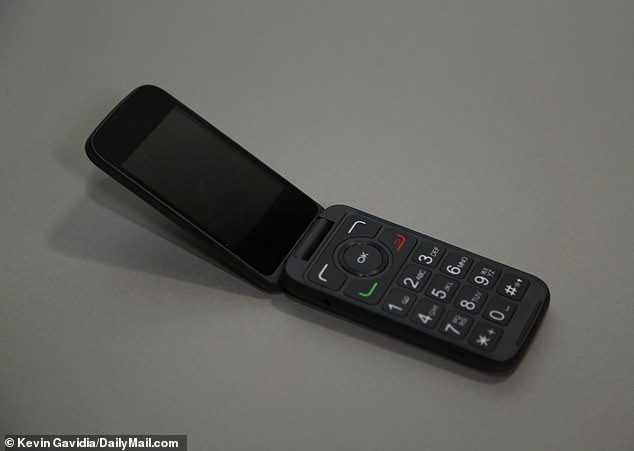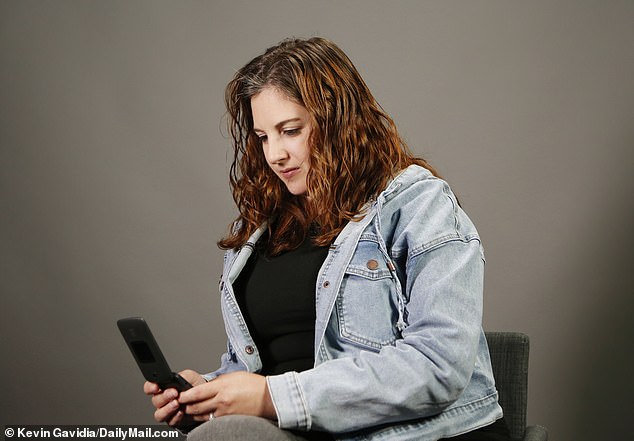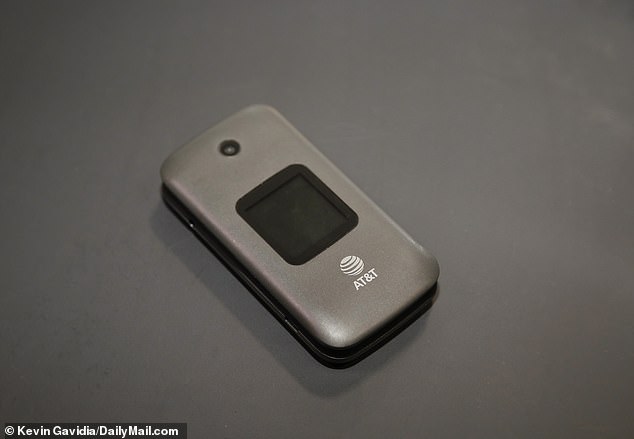Science writer ditches her iPhone and switches to a ‘dumb’ cell to curb her addiction – but what happened next left her shocked and put a strain on her marriage
I remember standing in the middle of an Applebee’s restaurant in my waitress uniform in 2011, arguing with a coworker over a smartphone.
“I refuse,” I told her. “I don’t want to become addicted to my phone.”
I was in college and would spend hours scrolling through Facebook on my laptop between classes. I didn’t want to be reachable like that all the time.
A year later, I finally gave up hope and bought my first Samsung smartphone.
In the ten years that followed, my smartphone has become an extension of myself. I am sure you can relate to this.
It is my timekeeper, diary, calendar and music player. I use it to do my grocery list, read newspapers and listen to audiobooks.
I recently wrote about a new anti-tech movement where people are ditching their smartphones and switching to so-called dumb phones, or mobile phones that can only perform basic functions.
And I thought it looked very liberating, so I decided to just give it a try.
I bought a $50 Alcatel AT&T flip phone from Amazon with a $30 prepaid plan.
This one was the most appealing because it was so cheap and had good reviews on even the most basic features.
The phone could text and make calls, but you couldn’t play games with it – not even the iconic Snake.
I could take pictures with it, but of course they didn’t look as professional as the pictures I can take with my smartphone.
Two days before I was supposed to switch to my dumb phone, the unthinkable happened: my wallet got stolen and thanks to my smartphone I was warned in time that someone was charging my credit cards. This allowed me to immediately block all my accounts.

I bought a $50 Alcatel AT&T flip phone from Amazon with a $30 prepaid plan. This one was the most appealing because of how cheap it was and it also had good reviews for its very basic features
The experience certainly didn’t alleviate my concerns about giving up my constant access to the Internet. I began to wonder if I had made a mistake by going back in time.
But when I got it in the mailbox, I immediately felt a sense of nostalgia.
‘Those were the days,’ I thought as I inserted the purchased SIM card. With it I could make unlimited calls and send text messages.
I thought back to my first flip phone, which I got at a time when it cost 10 cents to send or receive a text message and calls to carriers other than Verizon were only free after 9 p.m.
And God forbid you accidentally open a browser. That was usually followed by a panic attack to close it before a hefty bill appeared on your parents’ phone bill.
The phone’s keyboard was much larger than I remembered. Until I realized that it was probably meant for older generations who don’t want to upgrade to the latest technology.
I was immediately transported back to a simpler time, but it wasn’t long before panic set in.
Because I couldn’t scroll through social media or play Sudoku on my phone before bed, I couldn’t fall asleep before midnight and often woke up at 2am, worried that I had missed an important notification.
If you’re like me, your conversations with friends and family are conducted via text, WhatsApp, Instagram, and Facebook Messenger. I was worried that I wouldn’t respond right away and that I would miss photos or videos of my nephews and events that the girls in my book club were planning.
In the evening before going to bed I would sit at my laptop with WhatsApp and my social media platforms on screen. I would get frustrated because it would take me 20 minutes of my precious one hour lunch break during the day to answer four messages.
As I traveled to work by bus and then subway, I quickly felt uncomfortable, worried that people would judge me as I slowly typed out responses to what seemed like a long-dead relic.

By the end of the first week I noticed something I didn’t expect or anticipate: switching to a dumb phone was hurting my relationships. I felt left out of all group conversations and found myself talking to my family and friends a lot less than I normally do.
When I texted my husband, “What do you want for dinner?” I realized why my girlfriends and I developed a kind of shorthand in my teenage years.
That’s because it took forever to type the simplest sentences! Changing ‘be right back’ to ‘brb’ and even short words like ‘for’ to ‘4’ and ‘you’ to ‘u’ made much more sense now.
But by day four, I was already amazed at how quickly I had adjusted to my new normal and how I was even starting to enjoy it.
I started to accept that I wouldn’t see some messages right away and after a bit of stress about not having access to my emails all the time, I started to enjoy being able to completely disconnect from work at home.
The quiet moments gave me more time to do household chores that I would normally neglect, like spending an hour weeding the house or hanging the mirror that I promised my husband I would hang when I bought it six months ago.
While this all may not sound too surprising, by the end of the first week I noticed something I didn’t expect or anticipate: switching to a dumb phone was negatively impacting my relationships.
I felt left out of all the group conversations and found myself talking to my family and friends much less than I normally do.
But it wasn’t until my partner asked me to please go back to my smartphone, because he felt we were less connected when texting on my dumb phone, that I had to conclude that it was my fault.
My responses were slower and shorter than normal, making the conversation awkward and uncomfortable.
Once I realized this, I couldn’t even enjoy the smallest aspects of my newfound freedom from modern technology and began counting down the days until it would all be over.
Being disconnected from social media lost its appeal when I went to the beach or camping and was forced to upload photos to my laptop to post, an unnecessary and time-consuming step.
I stopped posting, which made me feel even more disconnected from my loved ones. But it was the constant problem with texting that made me so tired I wanted to throw this rock out the nearest window.

After this two-week trial, my advice to anyone considering taking the dumb phone challenge: don’t do it unless the rest of the world joins you.
When the two-week prison sentence I had imposed on myself was almost over, my girlfriend asked if she could ask me for advice.
My first reaction was, “Can I call you soon to chat?” but her response, “Texting is better. I’m working late,” left me feeling tired, knowing it would take at least 15 minutes to give her the answer she deserved.
In the last days of using a smartphone, I struggled with the fact that I still couldn’t listen to music in the car. So I turned on the radio, which had more commercials than I could remember from the pre-Spotify days.
Without the help of Google Maps or a printer to use Map Quest, going out to dinner with a friend became a chore. I also missed being able to participate in chat conversations with family and friends, which just didn’t work on this phone.
Would it be an advantage to give up my smartphone for two weeks, you might ask? That is a question I am still trying to find an answer to.
Aside from the fact that my phone’s battery lasts longer than a day, this was one trip I could have done without.
And after this two-week trial, my advice to anyone considering taking the dumb phone challenge: don’t do it unless the rest of the world joins in.
